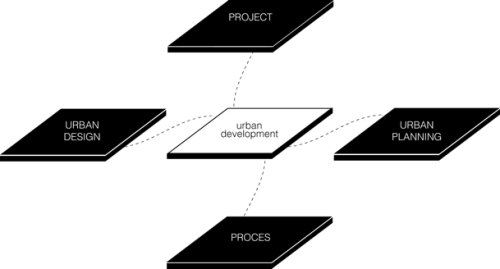The aim of our research group is to contribute to the development of knowledge on urban development, focussed on the sustainable transformation of the city. That knowledge development concerns both the spatial and process aspects of urban development. The dual perspective of our master program on Urbanism and Spatial Planning, which focuses on the design of innovative solutions as well as strategically implementing projects in a real policy context, is reflected in the research agenda of the research group. The research thus operates at a crossroads between social sciences, human sciences, and design. Hence, we are the only research team in Flanders that combines urban design with spatial planning within a single research group.

The research group delivers both basic and applied research. Fundamental research analyses the mutual relationship between physical (urban) developments and social developments, spatial governance and urban development policy processes. Policy-oriented or applied research is aimed at designing innovative spatial projects, instruments and policies, spatial impact assessment or evaluating existing urban development projects. Members of the research group apply a wide array of research methods such as design research, historic research, juridical research, case study research and quantitative research.
NEXUS
The growth of research within the research group has resulted in a stronger nexus with the educational program of the Master in Spatial Planning and Urban Design in different ways. Since 2014, a co-ordinated list of master's thesis topics is provided by the researchers. The subjects align with the research tracks of the research group. At the same time, the results of the master theses offer opportunities for the research group, such as knowledge building and the strengthening of the research lines. Since 2016, also the design studios of the master program of Urbanism and Spatial Planning are being used to feed the research group. In 2016-2017, the design studio subject was based on two ongoing research projects, ie. Resilient villages and the Reassessment of the mobility plan of the Province of Antwerp. Hence, a cooperation agreement was signed with the Province of Antwerp. The study results of the studio were shared with the Province, in return for obtaining their data sets, and getting feedback from the relevant administrations. The plans and models of our students are currently used in ongoing policy making of the Province. In 2017-2018 the design studios aligned with the research on Bicycle Oriented Design & Development (BOD). For this nexus, the research group engaged into an even bigger alliance with the work field. A large user group was established within the framework of the BOD research project, displaying a wide variety of stakeholders: all levels of government (Flemish Department of Public Works, the Province, the City of Antwerp), mobility experts, user organizations, mobility providers, but also action groups clearly committed to be directly involved in the research at hand. In the past, the master program collaborated in similar fruitful ways with the cities of Lier (2013), Vilvoorde (2014), Bruges (2015) and Ostend (2016).